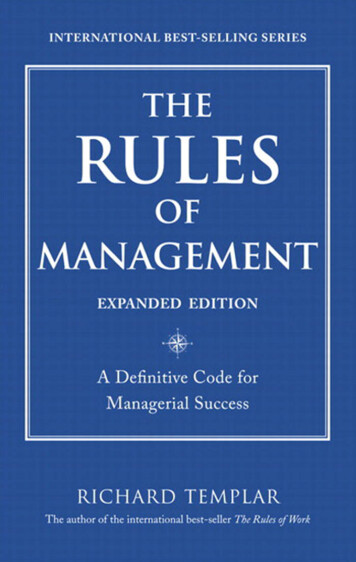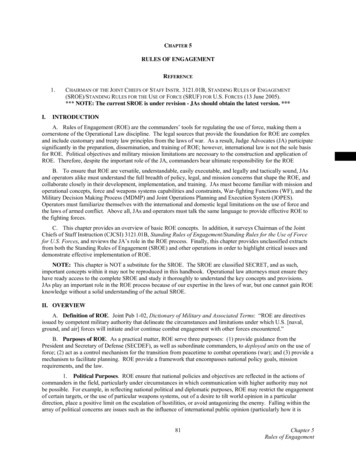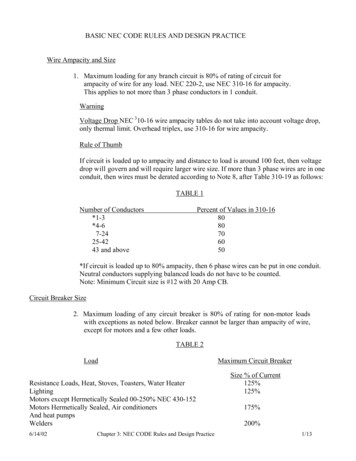
Transcription
THERULES OFMANAGEMENTA Definitive Code forManagerial SuccessE X PA N D E D E D I T I O NRICHARD TEMPLAR
Vice President, Publisher: Tim MooreAssociate Publisher and Director of Marketing: Amy NeidlingerAquisitions Editor: Megan ColvinSenior Marketing Manager: Julie PhiferAssistant Marketing Manager: Megan ColvinCover Designer: Alan ClementsManaging Editor: Kristy HartSenior Project Editor: Jovana San Nicolas-ShirleyProofreader: Apostrophe Editing ServicesSenior Compositor: Gloria SchurickManufacturing Buyer: Dan Uhrig 2011 by Pearson Education, Inc.Publishing as FT PressUpper Saddle River, New Jersey 07458Authorized adaptation from the original UK edition, entitled The Rules ofManagement, Second Edition, by Richard Templar, published by Pearson EducationLimited, Pearson Education 2011.This U.S. adaptation is published by Pearson Education Inc, 2011 by arrangement with Pearson Education Ltd, United Kingdom.FT Press offers excellent discounts on this book when ordered in quantity for bulkpurchases or special sales. For more information, please contact U.S. Corporateand Government Sales, 1-800-382-3419, corpsales@pearsontechgroup.com. For salesoutside the U.S., please contact International Sales at international@pearson.com.Company and product names mentioned herein are the trademarks or registeredtrademarks of their respective owners.All rights reserved. No part of this book may be reproduced, in any form or by anymeans, without permission in writing from the publisher.Rights are restricted to U.S., its dependencies, and the Philippines.Printed in the United States of AmericaFirst Printing May 2011ISBN-10: 0-13-273310-2ISBN-13: 978-0-13-273310-6Pearson Education LTD.Pearson Education Australia PTY, Limited.Pearson Education Singapore, Pte. Ltd.Pearson Education North Asia, Ltd.Pearson Education Canada, Ltd.Pearson Educación de Mexico, S.A. de C.V.Pearson Education—JapanPearson Education Malaysia, Pte. Ltd.Library of Congress Cataloging-in-Publication DataTemplar, Richard, 1950-2006.The rules of management : a definitive code for managerial success / RichardTemplar. — Expanded ed.p. cm.Rev. ed. of: The rules of management : a definitive code for managerial success. 2005.ISBN 978-0-13-273310-6 (pbk. : alk. paper)1. Management. 2. Executives. 3. Executive ability. I. Title.HD31.T45 2011b658—dc222011011469
ContentsPart 30Managing Your Team . . . . . . . . . . . . . . . . . . . . . . .1Get Them Emotionally Involved . . . . . . . . . . . . . . . . . . . . . . .4Know What a Team Is and How It Works . . . . . . . . . . . . . . . .6Set Realistic Targets—No, Really Realistic . . . . . . . . . . . . . .8Hold Effective Meetings . . . . . . . . . . . . . . . . . . . . . . . . . . .10 No, Really Effective . . . . . . . . . . . . . . . . . . . . . . . . . . . . . .12Make Meetings Fun . . . . . . . . . . . . . . . . . . . . . . . . . . . . . . . .14Make Your Team Better Than You . . . . . . . . . . . . . . . . . . . .16Know Your Own Importance . . . . . . . . . . . . . . . . . . . . . . . . .18Set Your Boundaries . . . . . . . . . . . . . . . . . . . . . . . . . . . . . . .20Be Ready to Prune . . . . . . . . . . . . . . . . . . . . . . . . . . . . . . . .22Offload as Much as You Can—or Dare . . . . . . . . . . . . . . . . .24Let Them Make Mistakes . . . . . . . . . . . . . . . . . . . . . . . . . . .26Accept Their Limitations . . . . . . . . . . . . . . . . . . . . . . . . . . .28Encourage People . . . . . . . . . . . . . . . . . . . . . . . . . . . . . . . . .30Be Very, Very Good at Finding the Right People . . . . . . . . .32Hire Raw Talent . . . . . . . . . . . . . . . . . . . . . . . . . . . . . . . . . . .34Take the Rap . . . . . . . . . . . . . . . . . . . . . . . . . . . . . . . . . . . . .36Give Credit to the Team When It Deserves It . . . . . . . . . . . .38Get the Best Resources for Your Team . . . . . . . . . . . . . . . .40Celebrate . . . . . . . . . . . . . . . . . . . . . . . . . . . . . . . . . . . . . . . .42Keep Track of Everything You Do and Say . . . . . . . . . . . . . .44Be Sensitive to Friction . . . . . . . . . . . . . . . . . . . . . . . . . . . . .46Create a Good Atmosphere . . . . . . . . . . . . . . . . . . . . . . . . .48Inspire Loyalty and Team Spirit . . . . . . . . . . . . . . . . . . . . . .50Have and Show Trust in Your Staff . . . . . . . . . . . . . . . . . . . .52Respect Individual Differences . . . . . . . . . . . . . . . . . . . . . .54Listen to Ideas from Others . . . . . . . . . . . . . . . . . . . . . . . . .56Adapt Your Style to Each Team Member . . . . . . . . . . . . . . .58Let Them Think They Know More Than You(Even if They Don’t) . . . . . . . . . . . . . . . . . . . . . . . . . . . . . . . .60Don’t Always Have to Have the Last Word . . . . . . . . . . . . . .62iii
31323334353637Understand the Roles of Others . . . . . . . . . . . . . . . . . . . . .64Ensure People Know Exactly What Is Expected of Them . .66Have Clear Expectations . . . . . . . . . . . . . . . . . . . . . . . . . . . .68Use Positive Reinforcement Motivation . . . . . . . . . . . . . . . .70Don’t Try Justifying Stupid Systems . . . . . . . . . . . . . . . . . .72Be Ready to Say Yes . . . . . . . . . . . . . . . . . . . . . . . . . . . . . . .74Train Them to Bring You Solutions, Not Problems . . . . . . .76Part 626364ivManaging Yourself . . . . . . . . . . . . . . . . . . . . . . . .79Work Hard . . . . . . . . . . . . . . . . . . . . . . . . . . . . . . . . . . . . . . .82Set the Standard . . . . . . . . . . . . . . . . . . . . . . . . . . . . . . . . . .84Enjoy Yourself . . . . . . . . . . . . . . . . . . . . . . . . . . . . . . . . . . . .86Don’t Let It Get to You . . . . . . . . . . . . . . . . . . . . . . . . . . . . . .88Know What You Are Supposed to Be Doing . . . . . . . . . . . . .90Know What You Are Actually Doing . . . . . . . . . . . . . . . . . . .92Value Your Time . . . . . . . . . . . . . . . . . . . . . . . . . . . . . . . . . . .94Be Proactive, Not Reactive . . . . . . . . . . . . . . . . . . . . . . . . . .96Be Consistent . . . . . . . . . . . . . . . . . . . . . . . . . . . . . . . . . . . .98Set Realistic Targets for Yourself—No, Really Realistic . .100Have a Game Plan, but Keep It Secret . . . . . . . . . . . . . . .102Get Rid of Superfluous Rules . . . . . . . . . . . . . . . . . . . . . . .104Learn from Your Mistakes . . . . . . . . . . . . . . . . . . . . . . . . .106Be Ready to Unlearn—What Works, Changes . . . . . . . . .108Cut the Crap—Prioritize . . . . . . . . . . . . . . . . . . . . . . . . . . .110Cultivate Those in the Know . . . . . . . . . . . . . . . . . . . . . . . .112Know When to Kick the Door Shut . . . . . . . . . . . . . . . . . . .114Fill Your Time Productively and Profitably . . . . . . . . . . . . .116Have a Plan B and a Plan C . . . . . . . . . . . . . . . . . . . . . . . .118Capitalize on Chance—Be Lucky, but Never Admit It . . . .120Recognize When You’re Stressed . . . . . . . . . . . . . . . . . . . .122Manage Your Health . . . . . . . . . . . . . . . . . . . . . . . . . . . . . .124Be Prepared for the Pain and Pleasure . . . . . . . . . . . . . . .126Face the Future . . . . . . . . . . . . . . . . . . . . . . . . . . . . . . . . . .128Head Up, Not Head Down . . . . . . . . . . . . . . . . . . . . . . . . . .130See the Forest and the Trees . . . . . . . . . . . . . . . . . . . . . . .132Know When to Let Go . . . . . . . . . . . . . . . . . . . . . . . . . . . . .134THE RULES OF MANAGEMENT
909192939495969798Be Decisive, Even if It Means Being Wrong Sometimes .136Adopt Minimalism as a Management Style . . . . . . . . . . . .138Visualize Your Plaque . . . . . . . . . . . . . . . . . . . . . . . . . . . . .140Have Principles and Stick to Them . . . . . . . . . . . . . . . . . .142Follow Your Intuition . . . . . . . . . . . . . . . . . . . . . . . . . . . . . .144Be Creative . . . . . . . . . . . . . . . . . . . . . . . . . . . . . . . . . . . . .146Don’t Stagnate . . . . . . . . . . . . . . . . . . . . . . . . . . . . . . . . . . .148Be Flexible and Ready to Move On . . . . . . . . . . . . . . . . . . .150Remember the Object of the Exercise . . . . . . . . . . . . . . . .152Remember That None of Us Has to Be Here . . . . . . . . . .154Go Home . . . . . . . . . . . . . . . . . . . . . . . . . . . . . . . . . . . . . . .156Keep Learning—Especially from the Opposition . . . . . . .158Be Passionate and Bold . . . . . . . . . . . . . . . . . . . . . . . . . . .160Plan for the Worst, but Hope for the Best . . . . . . . . . . . . .162Let the Company See You Are on Its Side . . . . . . . . . . . . .164Don’t Bad-Mouth Your Boss . . . . . . . . . . . . . . . . . . . . . . . .166Don’t Bad-Mouth Your Team . . . . . . . . . . . . . . . . . . . . . . .168Accept that Some Things Bosses Tell You to Do Will BeWrong . . . . . . . . . . . . . . . . . . . . . . . . . . . . . . . . . . . . . . . . . .170Accept That Bosses Are as Scared as You Are at Times .172Avoid Straitjacket Thinking . . . . . . . . . . . . . . . . . . . . . . . . .174Act and Talk as if One of Them . . . . . . . . . . . . . . . . . . . . . .176If in Doubt, Ask Questions . . . . . . . . . . . . . . . . . . . . . . . . .178Show You Understand the Viewpoint of Underlings andOverlings . . . . . . . . . . . . . . . . . . . . . . . . . . . . . . . . . . . . . . .180Add Value . . . . . . . . . . . . . . . . . . . . . . . . . . . . . . . . . . . . . . .182Don’t Back Down—Be Prepared to Stand Your Ground . .184Don’t Play Politics . . . . . . . . . . . . . . . . . . . . . . . . . . . . . . . .186Don’t Criticize Other Managers . . . . . . . . . . . . . . . . . . . . .188Share What You Know . . . . . . . . . . . . . . . . . . . . . . . . . . . . .190Don’t Intimidate . . . . . . . . . . . . . . . . . . . . . . . . . . . . . . . . .192Be Above Interdepartmental Warfare . . . . . . . . . . . . . . . .194Show That You’ll Fight to the Death for Your Team . . . . .196Aim for Respect Rather Than Being Liked . . . . . . . . . . . .198Do One or Two Things Well and Avoid the Rest . . . . . . . .200Seek Feedback on Your Performance . . . . . . . . . . . . . . . .202CONTENTSv
99 Maintain Good Relationships and Friendships . . . . . . . . .204100 Build Respect—Both Ways—Between You and YourCustomers . . . . . . . . . . . . . . . . . . . . . . . . . . . . . . . . . . . . . .206101 Go the Extra Mile for Your Customers . . . . . . . . . . . . . . . .208102 Be Aware of Your Responsibilities . . . . . . . . . . . . . . . . . . .210103 Be Straight at All Times and Speak the Truth . . . . . . . . .212104 Don’t Cut Corners—You’ll Get Discovered . . . . . . . . . . . .214105 Find the Right Sounding Board . . . . . . . . . . . . . . . . . . . . .216106 Be in Command and Take Charge . . . . . . . . . . . . . . . . . . .218107 Be a Diplomat for the Company . . . . . . . . . . . . . . . . . . . . .220End Game . . . . . . . . . . . . . . . . . . . . . . . . . . . . . . . . . . . . .222viTHE RULES OF MANAGEMENT
IntroductionStrange thing, management. It’s something few of us set out inlife to do, yet most of us find ourselves doing at some point.Careers adviser:What would you like to do when you leaveschool?16-year-old:I want to be a manager.Did this happen to you? No, me neither. But here you areanyway.As a manager you are expected to be a lot of things. A tower ofstrength, a leader and innovator, a magician (conjuring up payraises, resources and extra staff at the drop of a hat), a kindlyuncle/aunt, a shoulder to cry on, a dynamic motivator, a sternbut fair judge, a diplomat, a politician, a financial wizard (no,this is quite different from being a magician), a protector, asavior and a saint.You are responsible for a whole gang of people that you probably didn’t pick, may not like, and might have nothing incommon with and who perhaps won’t like you much. Youhave to coax out of them a decent day’s work. You are alsoresponsible for their physical, emotional, and mental safetyand care. You have to make sure they don’t hurt themselves—or each other. You have to ensure they can carry out their jobsaccording to whatever rules your industry warrants. You haveto know your rights, their rights, the company’s rights, and thegovernment’s rights.And on top of all this, you’re expected to do your job as well.Oh yes, and you have to remain cool and calm—you can’tshout, throw things, or have favorites. This management business is a tall order .INTRODUCTIONvii
You are responsible for looking after and getting the best outof a team. This team may behave at times like small children—and you can’t smack them* (or possibly even fire them). Atother times they will behave like petulant teenagers—sleepingin late, not showing up, refusing to do any real work if they doshow up, quitting early—that sort of thing.Like you, I’ve managed teams (in my case, up to 100 people ata time). People whose names I was expected to know and alltheir little foibles—ah, Heather can’t work late on a Tuesdaybecause her daughter has to be picked up from her play group.Trevor is color blind, so we can’t use him at the trade show.YO U A R E R E S P O N S I B L EFO R A W H O L E GA N G O FP E O P L E T H AT YO UP R O B A B LY D I D N ’ T P I C K ,M AY N OT L I K E , M I G H TH AV E N OT H I N G I NCOMMON WITH AND WHOP E R H A P S WO N ’ T L I K E YO UMUCH.* Yes, yes, I know you can’t smack children either. I was just making a point.Please don’t email me.viiiTHE RULES OF MANAGEMENT
Mandy sulks if left to answer the phones at lunchtime andloses customers. Chris is great in a team but can’t motivateherself to do anything solo. Ray drinks and shouldn’t beallowed to drive anywhere.As a manager, you are also expected to be a buffer zonebetween higher management and your staff. Nonsense maycome down from on high but you have to a) sell it to you
their little foibles—ah, Heather can’t work late on a Tuesday because her daughter has to be picked up from her play group. Trevor is color blind, so we can’t use him at the trade show. viii THE RULES OF MANAGEMENT YOU ARE RESPONSIBLE FOR A WHOLE GANG OF PEOPLE THAT YOU PROBABLY DIDN’T PICK, MAY NOT LIKE, MIGHT HAVE NOTHING IN COMMON .










